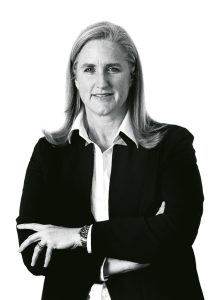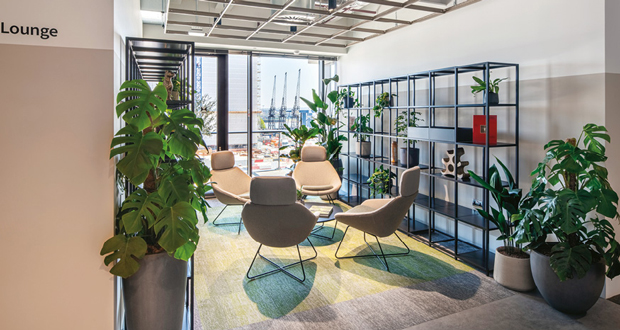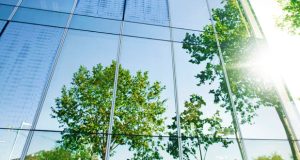 Sue Asprey Price the CEO of JLL’s EMEA Work Dynamics business talks to FMJ about the importance of sustainability and diversity within the property sector, and how she sees the future of the office
Sue Asprey Price the CEO of JLL’s EMEA Work Dynamics business talks to FMJ about the importance of sustainability and diversity within the property sector, and how she sees the future of the office
Amid all the dire predictions on the ‘death’ of the office which dominated the headlines last year, JLL’s Global Future of Work Survey(i) affirmed that nearly three quarters of decision makers still believe the office is critical to doing business. This goes to show, says Sue Asprey Price, JLL’s CEO for EMEA Work Dynamics that while the purpose of the office has been redefined it still forms the hub of organisational culture and plays a central role in the employee value proposition.
With nearly 30 years of experience in property consultancy, Asprey Price really knows the sector. She took up the CEO position last summer from her previous role as Head of Work Dynamics for the UK and Ireland, but began her career in her native Canada where, after a degree in economics and a masters in finance and architecture she entered the property consultancy sector, working on development projects and urban planning.
She was soon – rather to her surprise – made Head of Data Centres when her development company boss encouraged her to take the role. This led to working across Canada and the US and eventually brought her over to the UK in 2000. She explains: “My career in Europe has been mostly on the workplace consultancy side. I did step out at one point and set up a data centre advisory company, right around the time I was having children. I sold that business and moved back into the workplace advisory side and joined JLL’s Work Dynamics business around six years ago.”
She describes her new role as: “A dream come true to have a greater global remit, ranging from Africa to the Middle East where we help occupiers solve complex workforce and workplace challenges and drive the sustainability agenda. Europe alone is a diverse playground of cultures and languages and what I love about working in this region is that you do need to have a level of agility, as we come up with some incredible ideas and technologies but have to tweak them to suit the individual regional nuances.
“We do the full lifecycle of real estate – not just through an occupier lens but also help investors make their assets relevant for occupiers. In particular, with our project development and management services, we do as much work with investors as we do with occupiers.
“Our services and expertise have expanded significantly from when I started when the main focus was primarily on the location. We do much more now – including advising businesses on managing their workforce, with the assistance of our team of behavioural scientists and of course, ensuring sustainability is thoroughly embedded into the consultancy projects.”
A large part of the business is on the FM side where she argues the term facilities management as a scope has expanded significantly. “Here, we talk about human experience right through to how we deliver on health and safety, but also make sure we’re optimising assets. The exciting part of all our jobs is the scope of what we do and the skills and talent we need to be able to do that effectively.”
HYBRID WORKING
This expertise is sorely needed in a landscape which has changed dramatically since the pandemic, and where the very purpose of the office has been challenged. According to JLL data, while the office is still very much part of business – remote working is part of the overall working model, with the work environment being almost retail like, as the ‘shop window’ of an organisation.
“We’re evolving as an industry to help managers with hybrid work patterns provide a place for mentoring, training, and all those things that we struggle to get right over a zoom call,” she says. “This means the purpose of the office is being crystallised and where some roles are fully remote, the stats we’re getting back on employees who work in that way isn’t positive, with first year attrition rates up in the 25 per cent range. When you conduct exit interviews with those employees there is a lack of feeling engaged with the organisation and how they have not felt they were part of any culture.”
She explains that with agile space being created to encourage teams to work and socialise together; and a reliance on heavy desking being reduced, an increasingly important part of JLL’s workforce function is to advise managers on how to help their teams adapt to new working patterns.
“When you look at the diversity of companies that we work with, from life sciences to the tech sector and new emerging start-ups, having the ability to help managers embrace different ways is one of the key areas where we see we have a responsibility.
“At the same time, company culture is being completely redefined and has moved from encompassing the whole organisation to being more individual and team orientated. But a lot of the work done pre-pandemic still holds true, that is, creating destination spaces that support productivity.
“There is also a revival of food and other amenities as a way of drawing people together in the office. Prior to the pandemic that practice of installing internal staircases with ‘bump zones’ took off and post-pandemic the ‘casual bump’ is even more relevant. There is an efficiency element too in having informal conversations, not structured zoom calls. And of course, those interpersonal moments make you feel much more of a part of the organisation.”
Tagged with: diversity interview JLL JLL EMEA Work Dynamics business office future property sector real estate Sue Asprey Price sustainability





